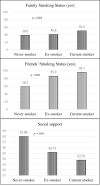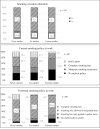Smoking in the workplace: A study of female call center employees in South Korea
- PMID: 35901095
- PMCID: PMC9333211
- DOI: 10.1371/journal.pone.0267685
Smoking in the workplace: A study of female call center employees in South Korea
Abstract
Smoking among women is characteristically high among call center employees and is associated with various individual and work-related characteristics, which have been paid little attention so far. This study explored the differences in intrapersonal and interpersonal characteristics and environmental factors among Korean women working in call centers by smoking status, based on an ecological model. In this cross-sectional study, an anonymous online survey was conducted among a sample of female employees from three credit card-based call centers (N = 588). Differences in intrapersonal (social nicotine dependence, smoking attitudes, emotional labor), interpersonal (smoking among family or friends, social support), and environmental factors (smoking cessation education, and perceived and preferred smoking policy at work) were compared according to smoking status (smokers, ex-smokers, and never smokers). Approximately 20% (n = 115) were smokers. Smokers were younger, mostly unmarried, had lower education, and had poorer perceived health status than ex- and never smokers. The mean scores for social nicotine dependence and smoking attitude were the highest among smokers, indicating their tendency to underestimate the negative effects of smoking. They also reported the highest level of emotional labor, with about half (50.4%) and almost all (95.7%) reporting smoking behaviors in their families and friends, respectively. Smokers took a lenient stance on the smoking ban policy. The results indicated the necessity to develop tailored smoking cessation programs to motivate female call center employees to quit smoking. As call centers may have a smoking-friendly environment, comprehensive smoking prevention programs considering multilevel factors are required to support smoking cessation.
Conflict of interest statement
The authors have declared that no competing interests exist.
Figures
Similar articles
-
A cross-sectional study on factors affecting the intention to quit smoking among female call centre employees.Nurs Open. 2023 Aug;10(8):5711-5719. doi: 10.1002/nop2.1821. Epub 2023 May 18. Nurs Open. 2023. PMID: 37199008 Free PMC article.
-
Women's Smoking: Relationships Among Emotional Labor, Occupational Stress, and Health Promotion.Workplace Health Saf. 2019 Jul;67(7):361-370. doi: 10.1177/2165079918823214. Epub 2019 Mar 2. Workplace Health Saf. 2019. PMID: 30827203
-
Mental health status and its predictors among call center employees: A cross-sectional study.Nurs Health Sci. 2017 Jun;19(2):228-236. doi: 10.1111/nhs.12334. Epub 2017 Mar 15. Nurs Health Sci. 2017. PMID: 28295980
-
Trend of Metabolic Syndrome Indicators in Working Korean Women According to Smoking Status and Workplace Size: A Population-Based Retrospective Longitudinal Study.Public Health Nurs. 2025 Mar-Apr;42(2):709-722. doi: 10.1111/phn.13510. Epub 2024 Dec 15. Public Health Nurs. 2025. PMID: 39676030 Free PMC article. Review.
-
Quitline Activity in the Republic of Korea.Asian Pac J Cancer Prev. 2016;17(S2):1-5. doi: 10.7314/apjcp.2016.17.s2.1. Asian Pac J Cancer Prev. 2016. PMID: 27108747 Review.
Cited by
-
A cross-sectional study on factors affecting the intention to quit smoking among female call centre employees.Nurs Open. 2023 Aug;10(8):5711-5719. doi: 10.1002/nop2.1821. Epub 2023 May 18. Nurs Open. 2023. PMID: 37199008 Free PMC article.
References
-
- World Health Organization. Tobacco 2021. [Cited 2021 July 20]. Available from: https://www.who.int/news-room/fact-sheets/detail/tobacco. In: WHO. Internet.
-
- Kim K. [Making a polluted space and body: labor control in a call center and the process of developing the stigma of female smoking]. Korean Soc Cult Anthropol. 2015;48: 45–87. Korean.
-
- Smoking Graham H., stigma and social class. J Soc Pol. 2012;41: 83–99. doi: 10.1017/S004727941100033X - DOI
Publication types
MeSH terms
LinkOut - more resources
Full Text Sources
Research Materials
Miscellaneous




